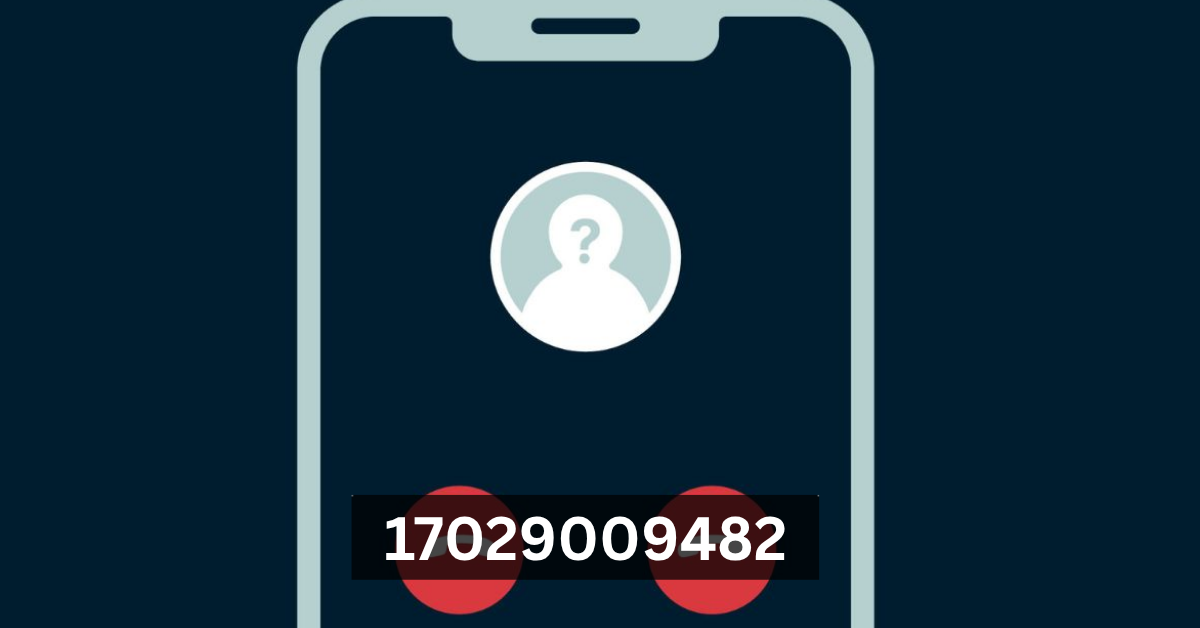The phone number 17029009482 has been appearing on caller IDs, voicemails, and even through text messages for many people in recent months. As with many unfamiliar numbers, users often question whether to answer the call, return it, or block it altogether. In a digital age where spam, robocalls, and fraudulent schemes are increasingly common, being able to identify unknown numbers has become a critical skill for consumers who want to protect their privacy and security.
Numbers like 17029009482 matter because they reflect the broader issue of unsolicited and suspicious communications. Many individuals receive daily spam calls that waste time, cause frustration, and sometimes pose real threats to financial or personal security. By examining this number specifically, we can better understand how these calls work, what risks they pose, and how everyday people can stay safe. Raising awareness around such numbers helps build digital trust and empowers users to act wisely instead of reacting with fear.
When people search for terms like “who called 17029009482,” or “is 17029009482 spam,” they are really looking for peace of mind. The most common concerns revolve around whether this number is tied to scams, whether it is a robocall, or whether it may belong to a legitimate business. Because spam tactics constantly evolve, users must remain cautious. This article brings together trusted insights, consumer reports, and expert advice to help readers make informed decisions.
What is 17029009482?
The number 17029009482 is a United States-based phone number, and it has surfaced across numerous scam reporting websites and consumer complaint forums. While not every call from this number can be classified as fraudulent, the overwhelming pattern shows that it has often been linked with nuisance calls, robocalls, and potential scams. Understanding the context of where this number comes from is the first step in deciding how to handle it.
Phone Number Breakdown and Origin
Breaking down the digits of this number gives us valuable insight. The country code is +1, which is assigned to the United States, Canada, and several nearby regions. The area code is 702, which specifically belongs to Nevada, most prominently covering Las Vegas and its surrounding areas. This suggests that calls may appear local to Nevada residents, though spoofing technology can easily disguise a call’s true origin.
Area Code 702 (Las Vegas, Nevada) Explained
The 702 area code is one of the oldest and most recognized in Nevada, famously associated with Las Vegas. While thousands of legitimate businesses operate under this code, scammers frequently use it to spoof calls, making people more likely to pick up. By mimicking familiar area codes, fraudsters exploit trust, hoping to convince recipients to answer or call back. This is why seeing a Nevada number such as 17029009482 doesn’t automatically confirm legitimacy—it demands further scrutiny.
Why People Search for 17029009482
Most people look up the number 17029009482 after experiencing something unusual. It might be repeated missed calls that seem suspicious, voicemails with robotic messages urging immediate action, or text messages with vague instructions. These scenarios often leave users unsure of whether the call is harmless or harmful, prompting them to search online for confirmation.
Human curiosity and the instinct for self-preservation drive people to investigate numbers like 17029009482. No one wants to miss an important call, but at the same time, no one wants to fall victim to a scam. With rising reports of robocalls, fraudulent schemes, and caller ID spoofing, consumers are rightly cautious. Searching online helps them separate potential threats from legitimate communications, and in the case of this number, the evidence leans heavily toward suspicious activity.
Is 17029009482 Spam or Legit?
Consumer reports on platforms like 800Notes, WhoCallsMe, and ScamPulse overwhelmingly describe calls from 17029009482 as spam. Many users state that when they answered, there was only silence, or they heard a pre-recorded sales pitch. Others reported aggressive telemarketing tactics, which only reinforced their decision to block the number. These patterns strongly suggest that the number is more nuisance than necessity.
The rise in robocalls has made numbers like 17029009482 increasingly common in complaint databases. Callers use automated dialing systems to reach thousands of people per minute, delivering pre-recorded messages that attempt to sell services or trick individuals into revealing personal information. Spoofing plays a significant role, making it appear that the call is local or from a trusted source. Together, these tactics highlight why consumers should exercise caution.
Who Might Be Behind 17029009482?
Some calls from this number appear to come from telemarketers pushing services such as insurance, credit repair, or product promotions. While not all telemarketing is inherently fraudulent, unsolicited calls can be invasive and violate consumer preferences, especially for those registered on the Do Not Call Registry.
The majority of reports tie 17029009482 to robocalls—calls made by machines delivering the same message to countless recipients. These calls often lack personalization, which makes them easy to identify. They may involve warranty scams, debt collection schemes, or fake government messages.
In some cases, people have reported phishing-style scams associated with this number. Callers pretending to be from banks, tax agencies, or government offices attempt to collect sensitive details such as Social Security numbers or bank account information. These scams can be extremely dangerous if not recognized early.
17029009482 and Robocall Trends
The last decade has seen robocalls become one of the most significant communication nuisances worldwide. Fraudsters rely on advanced automated systems that allow them to place millions of calls daily. Numbers like 17029009482 are just one example of how these systems exploit technology to target unsuspecting victims.
Caller ID spoofing is a technique where fraudsters manipulate the caller ID to make it appear that the call is coming from a trusted or local number. Spoofing allows scammers to bypass skepticism, increasing the chances that someone will answer. For people receiving a call from 17029009482, it may appear as if the call is local to Nevada, even though the true source could be overseas.
How to Identify Unknown Numbers Safely
Modern smartphones and telecom carriers offer caller ID services that help users identify spam calls before answering. Warnings like “Scam Likely” or “Spam Risk” provide instant guidance and can apply to numbers such as 17029009482.
Consumers can use reverse phone lookup services like Whitepages or AnyWho to check for details on unknown numbers. Searching “reverse lookup 17029009482” often shows user reports and spam warnings, helping people make informed decisions.
Third-party apps like Truecaller, Hiya, RoboKiller, and Nomorobo have become vital tools in the fight against spam. They maintain large, crowdsourced databases of suspicious numbers, meaning calls from 17029009482 can be instantly flagged and blocked.
Consumer Reports on 17029009482
The most common complaints about 17029009482 include repeated calls, silence on the line, and robotic sales pitches. Many people report frustration at the persistent nature of the calls.
A small number of users suggest that the call may be from legitimate businesses, but these cases are rare. Without clear identification, it remains difficult to prove legitimacy.
Online forums like ScamPulse, AARP Fraud Watch, and Better Business Bureau complaint boards often feature discussions about 17029009482. The consistent labeling of this number as spam reinforces its negative reputation.
Telecom Regulations and Protection
The FCC (Federal Communications Commission) and the FTC (Federal Trade Commission) play crucial roles in protecting consumers. They regulate telemarketing practices, impose fines on violators, and encourage reporting of suspicious numbers.
The Do Not Call Registry allows U.S. residents to block legitimate telemarketers. Unfortunately, scammers often ignore these rules, highlighting the importance of reporting violators like those behind 17029009482.
Telecom providers such as AT&T, Verizon, and T-Mobile now deploy STIR/SHAKEN, a call authentication framework that reduces spoofing. While not perfect, it is a critical step in combating calls from numbers like 17029009482.
Telecom Regulations and Protection
One of the most important aspects of understanding numbers like 17029009482 is learning about the regulatory measures in place to protect consumers from fraud, spam, and robocalls. In the United States, both the FCC (Federal Communications Commission) and the FTC (Federal Trade Commission) play major roles in regulating phone communication and enforcing anti-spam rules. The FCC has implemented frameworks like STIR/SHAKEN, a protocol designed to reduce caller ID spoofing by authenticating the origin of calls. This measure helps distinguish legitimate calls from fraudulent ones. Meanwhile, the FTC runs the Do Not Call Registry, a service where consumers can register their numbers to reduce unwanted telemarketing calls. Despite these protections, numbers like 17029009482 often slip through due to loopholes in enforcement and the sophistication of scammers.
Telecom providers such as AT&T, Verizon, T-Mobile, and Sprint have also stepped up efforts by integrating spam call warnings and offering blocking services directly within their networks. For example, AT&T ActiveArmor and Verizon Call Filter are systems that detect suspicious activity in real time. These proactive measures ensure that fewer fraudulent calls reach end users. Yet, consumer awareness remains the most powerful defense. By staying informed about potential scam numbers like 17029009482, individuals can better utilize tools, apps, and legal protections to secure their digital lives. This combination of federal regulations, telecom innovations, and personal vigilance creates a more secure communication ecosystem for everyone.
Global Perspective on Spam Numbers
Spam and scam calls are not confined to the United States; they are a global phenomenon. Numbers like 17029009482 highlight a trend that transcends borders, as similar automated systems operate in Europe, Asia, and beyond. For instance, in the European Union, regulatory frameworks like GDPR (General Data Protection Regulation) and agencies such as CNIL (Commission Nationale de l’Informatique et des Libertés) play a crucial role in ensuring data privacy and fighting spam communications. These laws are designed to hold organizations accountable if they misuse consumer data, including phone numbers, for unsolicited marketing or fraud attempts.
In many parts of the world, international robocalls create significant challenges because scammers exploit the anonymity of cross-border calls. Often, they disguise numbers to look local, tricking consumers into answering. In regions like India, Australia, and the UK, telecom regulators are implementing stricter penalties and call authentication technologies. The fight against fraudulent numbers has become a collaborative global effort, with data-sharing across nations helping identify suspicious trends. Therefore, when numbers like 17029009482 appear, it is not just a local concern but part of a much larger worldwide battle against telecommunication fraud.
How to Block Calls from 17029009482
One of the most practical questions users ask is: How do I block 17029009482? Fortunately, both iOS and Android devices offer easy methods for blocking unwanted calls. On an iPhone, you can navigate to the call log, select the number, and choose “Block this Caller.” This ensures that future attempts from the number are automatically declined. For Android devices, similar steps are available in the call history, where users can add suspicious numbers to their blocked list. Most modern smartphones also allow users to silence unknown callers entirely, filtering out nuisance calls without needing to address them directly.
Beyond built-in features, third-party apps provide advanced call-blocking tools. Applications like Truecaller, Hiya, RoboKiller, and Nomorobo not only block numbers like 17029009482 but also identify callers using massive community-driven databases. For example, if many users report 17029009482 as spam, these apps will flag the number for others in real time. Telecom providers also offer spam detection services that can be activated through their respective apps or account settings. With these tools combined, individuals can take back control of their phones and enjoy more peace of mind when it comes to avoiding fraudulent calls.
Reporting 17029009482 to Authorities
Blocking the number is only one step. To help protect others, it is equally important to report 17029009482 to the proper authorities. In the U.S., consumers can file complaints with both the FTC and the FCC, detailing the nature of the call and whether it was spam, a robocall, or a suspected scam. These reports feed into national databases that help investigators track patterns and build cases against repeat offenders. The FTC’s online complaint assistant is a user-friendly tool where anyone can quickly submit details about calls like 17029009482.
Globally, reporting systems vary but follow similar principles. In the UK, users can report nuisance calls to Ofcom, while in Australia, complaints go to the Australian Communications and Media Authority (ACMA). The effectiveness of these systems relies heavily on public participation. When individuals take the time to report calls, it strengthens collective defenses against scammers. Reporting numbers like 17029009482 not only reduces their impact but also contributes to the broader effort of safeguarding digital communication systems worldwide.
Impact of Spam Calls on Consumers
The consequences of numbers like 17029009482 extend far beyond simple annoyance. For many, privacy risks are the primary concern, as answering a suspicious call can expose individuals to phishing attempts or encourage further targeting by scammers. In some cases, fraudsters may attempt to extract sensitive personal information, such as Social Security numbers or banking credentials, leading to financial losses. Reports have shown that billions of dollars are lost annually to phone scams, highlighting the seriousness of the issue.
On a psychological level, constant spam calls cause stress and disruption. People may find themselves hesitant to answer unknown numbers, even when the call could be important. For businesses, repeated nuisance calls can hinder productivity and waste valuable time. Families may also feel unsafe when children or elderly relatives are exposed to fraudulent callers. In this way, numbers like 17029009482 represent not just a technological problem but also a societal challenge that affects trust in modern communication systems.
How to Stay Safe from Phone Scams
Staying safe requires vigilance and a clear set of practices for handling suspicious calls. First and foremost, never provide personal or financial information to unknown callers. Scammers often pose as representatives from banks, government agencies, or tech support companies, but legitimate organizations will rarely request sensitive data over the phone. Red flags to watch for include urgent language, requests for payment via gift cards, or threats of legal action. If a call from 17029009482 exhibits these traits, it is almost certainly fraudulent.
Another best practice is to avoid calling back unknown numbers, as this can confirm to scammers that your line is active. Instead, rely on reverse lookup tools or reporting platforms to verify the legitimacy of the number. Using spam-blocking apps and enabling caller ID features also provides an extra layer of security. By following these simple precautions, consumers can drastically reduce their risk of falling victim to scams while also contributing to broader awareness campaigns.
Entities and Organizations Fighting Spam Calls
The fight against spam numbers like 17029009482 involves a wide network of organizations. In the U.S., the FCC and FTC remain the primary regulators. The Better Business Bureau (BBB) and AARP Fraud Watch provide resources to educate consumers and warn them about active scams. Telecom providers like AT&T, Verizon, and T-Mobile continue to develop new systems for detecting and blocking fraud. Meanwhile, consumer advocacy groups play a critical role in lobbying for stronger protections and sharing scam alerts with the public.
On a technical level, the introduction of the STIR/SHAKEN framework has marked a turning point in spam prevention. By authenticating calls at the network level, it reduces the effectiveness of spoofing, one of the most common tactics used by scammers. Apps such as Truecaller and RoboKiller represent the consumer-facing side of this battle, combining global databases with real-time user feedback. Together, these entities form a multi-layered defense system designed to minimize the risks associated with numbers like 17029009482.
Case Study: 17029009482 User Experiences
User reports are often the most valuable source of insight into how numbers like 17029009482 operate. On forums such as 800Notes, WhoCallsMe, and ScamPulse, individuals frequently share their experiences. Many describe the number as part of a recurring robocall campaign, with pre-recorded messages offering fake loan services, extended car warranties, or fraudulent credit relief programs. Others have mentioned silent calls, where the caller disconnects after a few seconds—often a tactic used by automated dialing systems to test whether a number is active.
Interestingly, not all reports are negative. Some users claim they answered the call and were connected to a legitimate telemarketing company, though such cases are less common. This inconsistency is what makes numbers like 17029009482 difficult to classify definitively as either spam or legitimate. However, the pattern of complaints far outweighs neutral or positive feedback, strongly suggesting that this number is best treated with caution. These shared experiences demonstrate the power of community reporting: when users document encounters with 17029009482, it empowers others to recognize red flags and avoid falling victim to scams.
Future of Call Security
The war against spam numbers like 17029009482 is evolving rapidly. Telecom providers are investing in AI-powered detection systems that analyze massive datasets to identify and block fraudulent calls before they reach consumers. These systems learn patterns over time, making it harder for scammers to bypass filters. The STIR/SHAKEN framework, already in use across major U.S. carriers, is expected to expand globally, providing a more unified approach to caller ID authentication.
Emerging technologies also promise exciting new layers of protection. For example, machine learning algorithms embedded in call-blocking apps are already predicting scam behavior with impressive accuracy. Future smartphones may come with native AI assistants that automatically verify caller legitimacy. The rise of blockchain-based communication systems could further reduce spam by creating tamper-proof caller identification methods. Still, technology alone cannot solve the issue. Consumer education, vigilance, and reporting remain essential to keeping the digital communication landscape safe.
Conclusion
Numbers like 17029009482 serve as a reminder of the risks associated with modern communication systems. While some calls may appear harmless, the potential for fraud, scams, and identity theft means consumers must remain alert. By using tools such as reverse phone lookups, caller ID apps, and telecom blocking services, individuals can significantly reduce their exposure to unwanted calls. Federal protections from organizations like the FCC and FTC, combined with global privacy frameworks like GDPR, are further strengthening the safety net.
The key takeaway is that while robocalls and spam numbers remain a challenge, consumers are not powerless. With the right knowledge, apps, and precautions, you can take control of your phone again. Numbers like 17029009482 may come and go, but a strong awareness of digital safety practices will always protect you. By staying informed, reporting suspicious activity, and leveraging modern tools, you not only shield yourself but also contribute to a larger, safer ecosystem for everyone.
Frequently Asked Questions
Should I answer 17029009482?
Most experts recommend avoiding calls from numbers that are not saved in your contacts. If 17029009482 is important, the caller will likely leave a voicemail or contact you through another legitimate channel.
Is 17029009482 a scam?
While not every report confirms fraudulent activity, the overwhelming majority of user complaints suggest that it is associated with spam and robocalls. It is safest to assume caution.
Can I call back 17029009482?
Calling back an unknown number is not recommended. Many scammers use callback attempts to confirm active lines, leading to more spam in the future. Instead, use a reverse lookup directory to verify details.
What if I accidentally answered 17029009482?
If you answered but shared no personal information, you are likely safe. However, if you provided sensitive details, contact your bank, monitor accounts, and consider filing a fraud alert with the FTC.
How do I block 17029009482 permanently?
You can use built-in smartphone blocking tools, telecom provider services, or apps like Truecaller and RoboKiller to ensure you never receive another call from this number.
Stay in touch to get more updates & alerts on BaddieHub! Thank you



